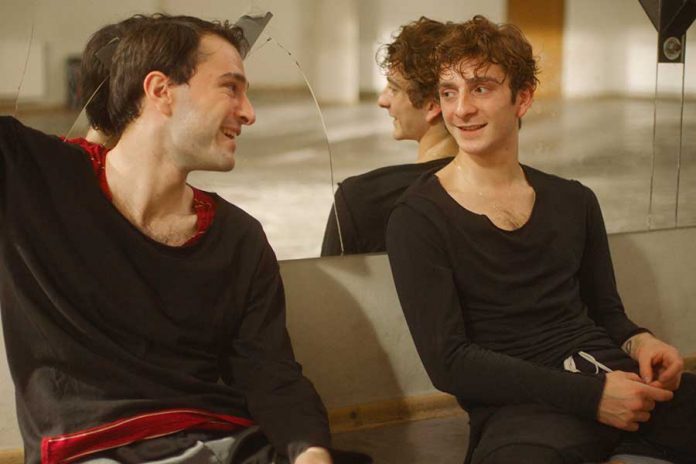“And Then We Danced” is out gay writer and director Levan Akin’s captivating drama about a closeted young dancer in Tbilisi. The film, which opens Feb. 28 at the Ritz Five, is the first LGBTQ feature set in Georgia. Last year, it generated protests from members of the far-right and Georgian Orthodox religious groups at its premiere in Tbilisi for its gay content. (The film is officially Swedish; Akin is Georgian by heritage, but he was born and lives in Stockholm). The controversy stemmed from the film depicting a same-sex romance in the traditional world of Georgian dance, where masculinity, not “weakness,” is valued.
Merab (Levan Gelbakhiani), is a dancer in the Georgian National Dance company. He has been dancing since he could walk and has long been partnered with Mary (Ana Javakishvili). While she would like a romantic connection with Merab, he prefers friendship and is cagey when she makes sexual overtures. When a replacement dancer, Irakli (Bachi Valishvili) joins the company, Merab initially sees this talented newcomer as a rival. But soon, he falls in love with him.
“And Then We Danced” chronicles Merab coming to terms with his sexuality. Merab has a difficult home life, where his family can barely afford to pay the electric bill. His brother David (Giorgi Tsereteli), is often drunk and a bit of a hothead. While David is a member of the dance troupe, he misses more rehearsals than he attends. One night, David brings Irakli home after a night of drinking. Merab becomes intrigued by — and attracted to — this handsome stranger. As the two dancers start practicing together, they develop a bond. A scene of them performing a duet in a rehearsal illustrates their connection. When Merab goes home with Irakli one afternoon, they have a conversation in his bedroom that brims with sexual tension. Neither man wants to make the first move, and their awkward silences convey the depth of their desires.
As Merab starts to fall deeply, inexorably, in love with Irakli, his whole personality changes. His grandmother (Marika Gogichaishvili) notices his oddly sunny disposition and keeps calling him “mad.” But Merab feels happy as he starts navigating an authentic life. He smiles goofily at the thought of Irakli, and his emotions are infectious. During an overnight trip to Mary’s family’s dacha, Merab sneaks out to share a cigarette with Irakli, and the men give in to their pent-up emotions, sharing an intense physical intimacy. Soon, Merab is dancing for Irakli as a way of expressing his love, and a scene of the two dancers lying opposite one another in a bed, staring into each other’s eyes, expresses their forbidden longing.
However, their romance is complicated not only by their need for them to keep it a secret but also by the fact that both Merab and Irakli are in competition for a position in the main ensemble. (Moreover, the dancer they are replacing is the subject of gay rumors, suggesting just how difficult it is to be out in Georgia).
“And Then We Danced” pivots as Merab experiences palpable anxiety when he loses contact with Irakli. His internal torment impacts him emotionally — he is cold toward Mary and others — and well as physically (he suffers an injury in practice). Adding insult to injury, Mareb is also called a “faggot” by one of his fellow dancers, who saw him at a gay club. As Merab’s world starts crumbling, a situation arises that pulls Merab in another direction.
Even if Akin’s film starts to get soapy or strained as it presents the typical coming out/coming of age narrative, the sense of time and place feels authentic and unerring. The camera follows Merab as if he was the subject of a documentary. Viewers quickly get a sense of his difficult life — dancing, working at a restaurant, his home life — and empathize with him. When Mareb spies another gay guy, Matte (Matt Shally), on a bus, (they later reconnect on the street), Akin’s observational approach presents this underground gay subculture without sensationalizing it. The film offers a glimpse into this hidden world. Even the scenes of family life feel real. While David and Merab are often at odds with one another, a tender, truthful moment shared between the brothers is quite moving.
Gelbakhiani gives a fantastic performance as Merab, expressing his complex feelings well. Scenes of him lying in bed, pulling the sheet over himself as he becomes overwhelmed by emotion, are revealing. Gelbakhiani also handles the dancing scenes with noticeable aplomb.
In support, Bachi Valishvili provides considerable sex appeal, although his character is somewhat underdeveloped.
“And Then We Danced” tells a heartfelt story of a young man’s sexual awakening. It is an important film that illustrates the difficulties of being gay in Georgia.
